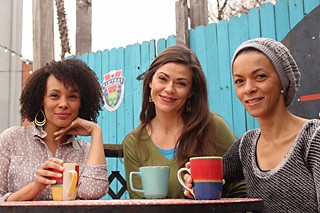The Good Eye: Tales From the Minority Box
Women of color talk about the casting bias
By Amy Gentry, Fri., March 6, 2015
Monique Straw (Meet Jane, The Secret Lives of Wives) is from rural Kansas, and you can still see a little bit of country in her freckles, curly hair, and thousand-watt smile. "I'm the all-American girl," she says.
But Straw's not in Kansas anymore; she's in Austin, trying to get work as an actress in a town where film roles are limited and women's roles even more so. On top of the double-bind faced by the Austin film actresses I spoke to for Parts I and II of this series ("Tales From the Beauty Box," Feb. 20, "Tales From the Quirky Box," Feb. 27), Straw, an African-American woman, is also in the "minority box."
The minority box is actually a series of boxes-within-boxes – black, Latina, East Asian, and ethnically ambiguous – each subdivided based on physical traits, and each with its own highly specific stereotypes. Despite their diversity, women in the minority box are nevertheless typically competing with one another for an extremely limited pool of roles, all of them minor. What these women have in common – the only thing they have in common – is that they aren't perceived as "white," and therefore have almost no hope of being cast in a role written to be widely relatable. "I'm just so average," Straw protests. "But I don't get to play average roles."
What does she get to play? "You can be from the hood. Or you can be coming out of the hood, and you want to leave that behind – so you're very polished, put-together, and jaded." Straw laughs. "Always jaded, as a black woman character. Always angry."
African-American actress Timeca Seretti (Frame Switch, Divine Access) expands the list: "As a woman of color, you're always cast as the prostitute. Or the snappy black woman with the attitude, rolling her neck and snapping her fingers. Or the maid. That's not all we are." Seretti herself is many things: a musician, singer, writer, and director, all skills that have helped her deal with the frustrations of limited acting roles. Although she continues to go out for roles, sometimes even those specified for Caucasian actresses, her dreams of playing an action star seem far away.
Speaking to Seretti, Straw, and Latina actress Christina Romero (Frame Switch, Cagers), I started to understand the intersectional impact of gender and race on nonwhite film actresses. It starts, as it does for all women, with fewer and less interesting roles. According to Romero, the ratio of roles for men and women on Austin Film Casting is something like eight-to-one on any given day. "You watch your peers who are male. They get more opportunities because there's more roles for them, so then their career momentum builds more easily."
As the years go by, the gap between men's and women's experience, clout, and connections widens rapidly; for nonwhite women, that widening is exponential. "Some of them get all these credits, and they think, 'I'm a better artist.' I look at him, and I'm like, 'Compared to women, you're talented, you're awesome, but you've had more opportunities.'" Moreover, the time pressure on actresses in terms of aging, which I'll discuss in next week's column, renders the consequences of falling behind even more damaging.
For Romero, who was born in Texas to Puerto Rican parents, maid roles are the worst kind of box. She says the Latina actresses who get steady work have résumés studded with these subservient, often non-speaking parts, and describes the pang of disappointment she feels every time she sees an actress she admires on film, opening a door in a starched uniform.
A brief look around the coffee shop where I'm interviewing Romero underscores the disjunct between what women of color are in life and what they seem inevitably to become as soon as they step in front of a camera. Even when this stereotyping comes from lazy writing rather than ill intent, it has a distorting and pernicious effect on how people of color are seen. Raised in a white community by her mother, who is white, Straw confesses with a shudder that she herself learned most of what she knew as a child about black culture from television – "And that's scary shit!" Now she sees her friends' children looking up to reality TV stars, who are often rewarded for embodying reductive stereotypes.
Sitting across from these three gorgeous women hammers home the fact that the beauty standards enforced by both Hollywood and indie films aren't just absurdly narrow – they're appallingly racist. Straw, who is lighter skinned, puts it this way: "I know if I would straighten my hair, I would get more jobs. I'd be ethnically ambiguous. But I'm like, 'Fuck you!' As a kid growing up I used to wear blue contacts and straighten my hair because I wanted to be a little white girl. ... I don't want to have to go back to that just to get work." After the momentary flare of anger has passed, she admits that she can imagine being driven to it someday.
Who could blame her when even nonwhite roles are routinely whitewashed in Hollywood? Think of Mariane Pearl's character in A Mighty Heart, or 99% of the casts of Exodus: Gods and Kings and 2016's Gods of Egypt. When the role is big or important, it can be changed from nonwhite to white; when it's a negative stereotype, it's more likely to go the other direction, like the time Romero was cast in a TV docudrama about a battered woman. The real-life story it was based on involved a Caucasian couple; "because of the violence, they changed it to Latinos," she says.
Straw, Seretti, and Romero are all fighting for change in a recently formed group of women filmmakers, which I'll write about in the final column in this series. In the meantime, they are stuck in somebody else's box, and it's a tight squeeze.
"It just doesn't make any sense to me," says Straw. "You guys are supposed to be the creative minds. You can create any world you want. Do something with it! Be brave. Be brave."
Next week: the Aging Box.









